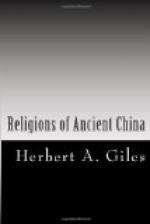Additional Deities.—Before, however, Shun ventured to mount the throne, he consulted the stars, in order to find out if the unseen Powers were favourable to his elevation; and on receiving a satisfactory reply, “he proceeded to sacrifice to God, to the Six Honoured Ones (unknown), to the Mountains and Rivers, and to Spirits in general. . . . In the second month of the year, he made a tour of inspection eastwards, as far as Mount T’ai (in modern Shantung), where he presented a burnt offering to God, and sacrificed to the Mountains and Rivers.”
God punishes the wicked and rewards the good.—The Great Yu, who drained the empire, and came to the throne in B.C. 2205 as first Emperor of the Hsia dynasty, followed in the lines of his pious predecessors. But the Emperor K’ung Chia, B.C. 1879-1848, who at first had treated the Spirits with all due reverence, fell into evil ways, and was abandoned by God. This was the beginning of the end. In B.C. 1766 T’ang the Completer, founder of the Shang dynasty, set to work to overthrow Chieh Kuei, the last ruler of the Hsia dynasty. He began by sacrificing to Almighty God, and asked for a blessing on his undertaking. And in his subsequent proclamation to the empire, he spoke of that God as follows: “God has given to every man a conscience; and if all men acted in accordance with its dictates, they would not stray from the right path. . . . The way of God is to bless the good and punish the bad. He has sent down calamities on the House of Hsia, to make manifest its crimes.”
God manifests displeasure.—In B.C. 1637 the Emperor T’ai Mou succeeded. His reign was marked by the supernatural appearance in the palace of two mulberry-trees, which in a single night grew to such a size that they could hardly be spanned by two hands. The Emperor was terrified; whereupon a Minister said, “No prodigy is a match for virtue. Your Majesty’s government is no doubt at fault, and some reform of conduct is necessary.” Accordingly, the Emperor began to act more circumspectly; after which the mulberry-trees soon withered and died.
Revelation in a dream.—The Emperor Wu Ting, B.C. 1324-1264, began his reign by not speaking for three years, leaving all State affairs to be decided by his Prime Minister, while he himself gained experience. Later on, the features of a sage were revealed to him in a dream; and on waking, he caused a portrait of the apparition to be prepared and circulated throughout the empire. The sage was found, and for a long time aided the Emperor in the right administration of government. On the occasion of a sacrifice, a pheasant perched upon the handle of the great sacrificial tripod, and crowed, at which the Emperor was much alarmed. “Be not afraid,” cried a Minister; “but begin by reforming your government. God looks down upon mortals, and in accordance with their deserts grants them many years or few. God does not shorten men’s lives; they do that themselves. Some are wanting in virtue, and will not acknowledge their transgressions; only when God chastens them do they cry, What are we to do?”




